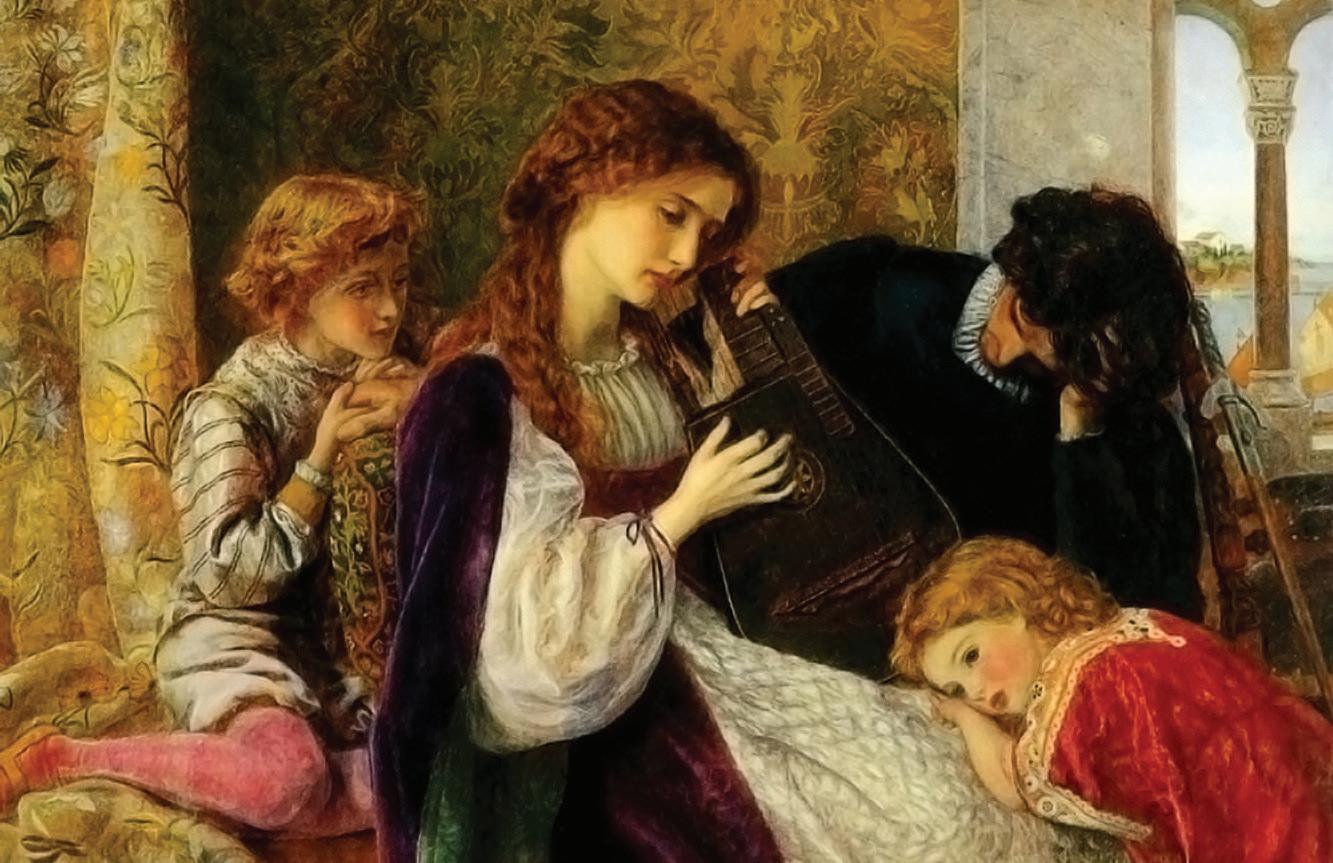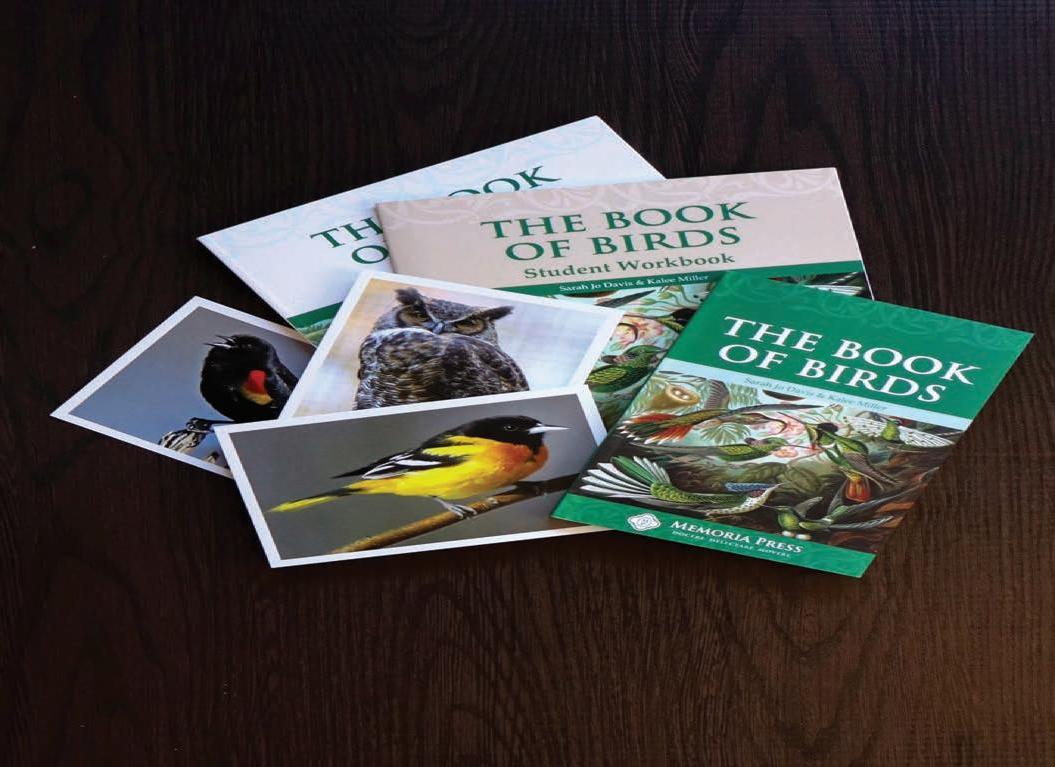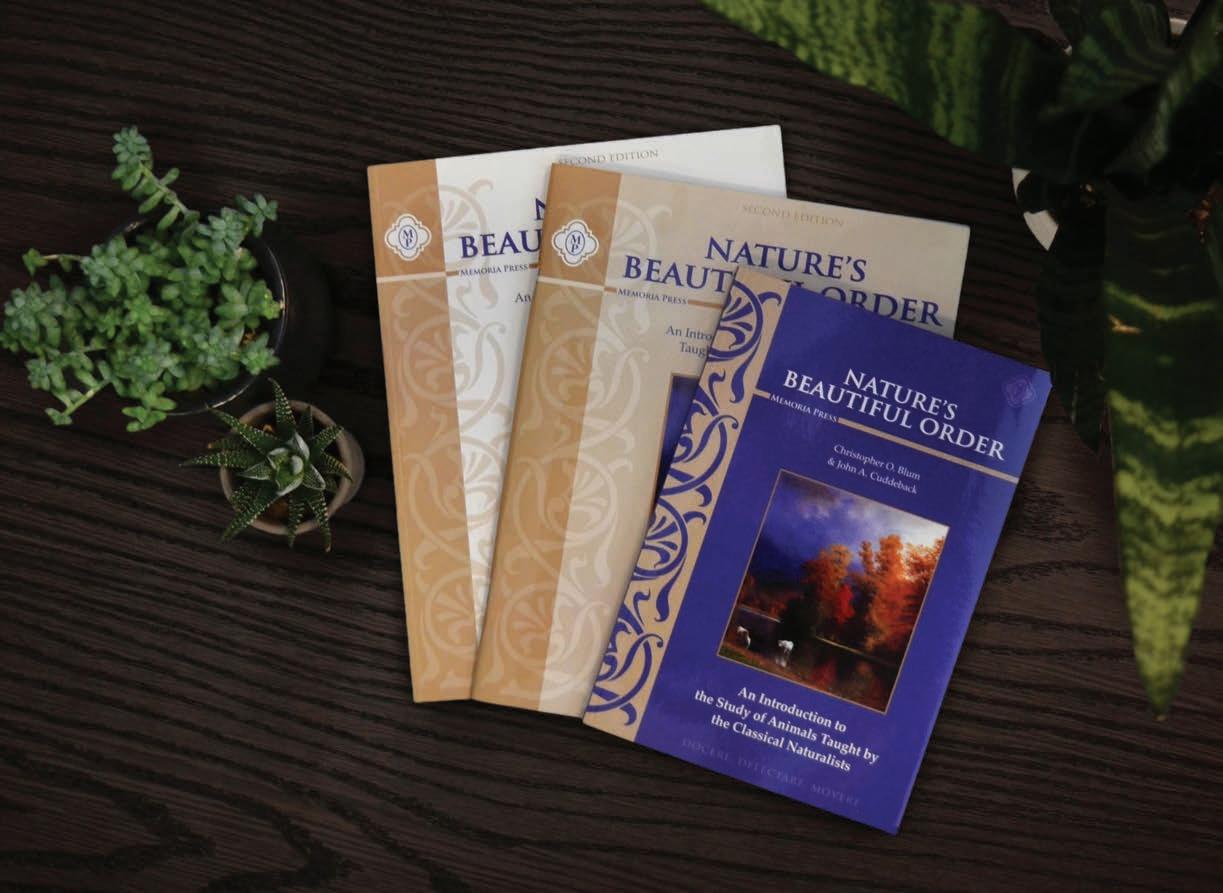
14 minute read
Classical Literature
Horatius at the Bridge
Grades 6+
$19.95 set (book, medal, pin) Book $14.95 Medal $5.00 | Lapel Pin $2.00
is study of Macaulay's 70-stanza ballad includes vocabulary, maps, character and plot synopses, meter, comprehension questions, teaching guidelines, and a test. Send us a recording of your students reciting the poem, and we'll send them a Winston Churchill Award certi cate, medal, and lapel pin.
e Aeneid for Boys & Girls
by Alfred J. Church Grades 6-8 $9.95
Alfred Church's retelling of Virgil's Aeneid is a great introduction to the story of Aeneas, who escaped from the burning city of Troy and founded Rome, the New Troy. Students will gain a good grasp of the characters and story of the Aeneid and be ready to tackle the more di cult writing of Virgil.
Classical Studies Suggested Timeline
If you don't begin your classical education until middle or high school, we recommend that you start with Year 5.
Year 1
D'Aulaires' Greek Myths
Year 2
Year 3
Year 4
Year 5
Year 6
Year 7
Year 8
Famous Men of Rome
Famous Men of the Middle Ages
Famous Men of Greece, e Trojan War, and Horatius at the Bridge
Iliad, Odyssey, and e Book of the Ancient Greeks
e Aeneid and e Book of the Ancient Romans
Greek Tragedies (Euripides, Sophocles, Aeschylus)
e Divine Comedy
e Trojan War
by Olivia Coolidge Grades 6-8
is faithful retelling of the events of the Trojan War is wonderful preparation for reading the Iliad and Odyssey in later years. Your student will become familiar with the main characters, the gods and goddesses, and the storyline of Homer's Iliad and Odyssey, presented in simple but captivating prose. Each lesson in the Student Guide has reading notes, vocabulary, comprehension questions, and an enrichment section with discussion topics, writing, art, and mapwork. Text $7.99 | Student $11.95 | Teacher $12.95
e Greek Tragedies
Grades 9+
$225 complete set
(3 texts, 3 student guides, 3 teacher guides, 3 instructional videos)
e Oresteian Trilogy by Aeschylus $13.00 e ree eban Plays by Sophocles $15.00 Medea & Other Plays by Euripides $11.00
Student $17.95 ea. | Teacher $17.95 ea. Instructional Videos: DVDs or Streaming $45.00 ea.
e Oresteian Trilogy
Aeschylus was the rst of the three great tragic playwrights. Join Orestes as he seeks to avenge his father's murder, but discovers, along with us, that revenge only begets revenge—that mercy and litigation are the better ends of justice.
e ree eban Plays
Here is Sophocles' story of Oedipus, fated to unknowingly kill his father and marry his mother. is is the great myth, in uencing all subsequent literature. Fate, free will, the quest for knowledge and truth—the glory and downfall of Western civilization.
Medea & Other Plays
Euripides further developed the tragedy, instituting the deus ex machina, a prologue, and greater realism. His heroes are less resolute and more psychological, fraught with internal con ict. In them we see the extremes of human nature: cold reason and maniacal passion, nobility and cruelty, triumph and regret, grief and comfort.
David West translation Grades 8+
$80 set (text, student, teacher, videos) Text $16.00 | Student $16.95 | Teacher $16.95 Instructional Videos: DVDs or Streaming $45.00
After Homer, the Aeneid is logically your next great book to study. Virgil's epic story of the founding of Rome will come alive when read with the help of our study guide as you continue your quest to master the classics. is is a great preparation for AP Latin also. Our Teacher Manual has inset student pages with teacher notes and background information for each lesson.
e Iliad & e Odyssey
Samuel Butler translation Grades 7+
$75 set ea.
(novel, student, teacher, videos)
$135 complete set
(Iliad and Odyssey sets)
Text $12.95 ea. | eBook $7.00 ea. Student $11.95 ea. | Teacher $12.95 ea. Instructional Videos: DVDs or Streaming $45.00 ea.

Western civilization begins with the two greatest works of the ancient world: the Iliad and the Odyssey. e enormous in uence these books have exerted in Western literature and art make them the perfect place to begin your study of Western culture. Samuel Butler's prose translations are both scholarly and easily accessible to students. e reading notes, focus passages, and comprehension and discussion questions in our Student Guides highlight important events, characters, and themes allowing your student to more deeply understand these seminal works. e Teacher Manuals include additional contextual background information and teaching tips, as well as complete answers to the Student Guides and unit tests.
e Divine Comedy
by Dante Alighieri, Translated by John Ciardi Grades 10+
$55 set (text, student, teacher, quizzes & tests) $105 complete set (all books + streaming instructional videos) Text $21.00 | Student $16.95 Teacher $16.95 | Quizzes & Tests $5.00 Streaming Instructional Videos $55.00
e Divine Comedy is one of the crown jewels of both Western and Christian literature. is epic, allegorical poem illustrates Dante's spiritual journey of redemption that takes him through the pit of Hell (the Inferno) to the Beati c Vision of God (the Paradiso). e Student Guide contains helpful study questions and reading notes for di cult lines. My fourteen-year-old completed [the Iliad] study, along with the Odyssey this year and reported: "The Iliad videos were a great help in reading the Iliad! They explained any confusions I had about the text, helped keep all the characters straight, and gave bonus historical information about the Trojan War. I absolutely recommend these for everyone who is planning to read the Iliad." — M. N.
e Republic and e Laws
by Cicero, Translated by Niall Rudd Grades 10+ Text $12.95 Student $17.95 Teacher $17.95
Marcus Tullius Cicero, a Roman statesman from the rst century B.C., was convinced that the upright moral life was the happier life. e Republic became the blueprint of the U.S. government almost 2,000 years after it was written. In e Laws, Cicero defends his understanding of the upright moral life. His writings became the foundation for the West's philosophical discussion on the natural law.
On Obligations
by Cicero, Translated by P. G. Walsh Grades 10+ Text $13.95 Student $17.95 Teacher $17.95 Cicero was a man trying to give the politicians of his day solid principles by which to live as they drove his fatherland, Rome, down the royal road of decay. His work On Obligations played a large role in Western Christendom but is daunting to read alone. Let us accompany your high schooler as he learns the principles of justice, wisdom, bene cence, courage, and propriety.

Better Than Background by Dr. Carol Reynolds
Iwas recently asked this question at a conference: "What classical music do you recommend I play in the background for my kids?"
Answering it is a bit of a delicate dance because I first need to say that any fruitful approach to classical music needs to place it in the foreground. Any serious art needs to engage the senses. There are of course times when background music can be enjoyable, and maybe even useful, but the amount of extraneous musical sound forced on us daily has conditioned us to view music merely as an accompaniment to something else. (Do we really need music blaring at us when we pump our gas?)
Children today, as well as many parents, dwell in a world of pre-recorded music. Few youngsters routinely encounter live music-making on the back porch, with
D r. Carol R eynolds is a widely acclaimed author, speaker, and educator. She regularly leads arts tours throughout Europe and the Mediterranean, recently in partnership with the Smithsonian Institute. neighbors bringing over banjos and accordions. Few children are likely to find themselves sitting midhall during a rehearsal of a good wind ensemble, symphonic choir, or orchestra. And even in church, fewer and fewer children experience the vast power of a pipe organ or the vigorous upsweep of traditional hymns sung by a congregation unafraid to sing.
Of course, recorded music provides a wonderful resource for both education and simple enjoyment. And background music seems so "easy" to present, a kind of distraction or automatic atmosphere-creator. But a child's musicality is not well-served by this ease, at least not without an initial, cognitively active exposure to the music presented.
In our courses at Professor Carol, we offer concrete steps for students of all ages to move from passive to active listening so that they can get the most out of the music they are encountering. This is not to say that music needs to be approached as though a test is waiting in the wings. Certainly not! So let me offer a few suggestions. MemoriaPress.com
First, have a purpose for picking whatever you N o. 1 will have meaning and bear musical and choose to play. If students are studying King Arthur's cognitive fruit for your child. Don't be surprised, for court, it is easy to find recordings of songs from the example, if you hear the child humming melodies
Middle Ages. Rather than plow through dozens from it or tapping out its rhythms. of these admittedly intriguing pieces, pick two or In a similar fashion, much can be gained by playing three, and try to offer the child a chance to hear them the soundtracks of dramatic works (musicals, opera, film performed in different ways, by different performers. scores) in the background, so long as the child knows the
Just this morning my granddaughter and I spent a works already, and particularly if your child has been little time listening to radically different renditions lucky enough to experience them live in a theater. of a favorite old ballad: "Barbara Allen." We moved And, yes, it is possible to go the other way by from an old-time string band to a mesmerizing French creating familiarity with a single song to lead into a chanteuse from the 1960s (Marie Laforêt, utterly new new work. So, for example, if you expect that your to me) to John Denver. family will be seeing a performance of The Music Man
Similarly, children are better or Cats or Carmen in the future, served by hearing a single then playing the songs (or, better movement of a symphony multiple times—particularly with different Children are better yet, singing through them at the piano or along with a recording) is orchestras and conductors—than by a drone of symphonic works put served by hearing a quite a good idea. But again, this is listening with a purpose. on in the background. single movement of Finally, even if the music
Thus, a parent might pick the is in the background, please first movement of Beethoven's a symphony multiple try to have good speakers for Symphony N o. 1 (or perhaps the delivering decent sound. The whole work at just under thirty times than by a drone of repertoire we call "classical" uses minutes). Here will be an attractive, easily accessible composition that symphonic works put on the full range of pitches (from high to low) and orchestra colors one can find online to watch or in the background. (string, wind, brass, percussion listen to in countless performances. timbres). These musical elements
Start with two performances. First, absolutely require decent speakers perhaps, a performance filmed from or they are lost. Alas, people a legendary conductor of the early or mid-twentieth have accepted the inferior sound of music delivered century, likely a bit fuzzy and probably in black and through the speaker in a laptop or the ubiquitous white, but now magically available online. Then turn plastic ear buds. That listening experience is neutral at to a recent, slickly filmed performance, with great best, and in many ways deleterious. cutaways to the players so that kids can match the Oh, these tinny sounds would annoy the sounds of the oboe, clarinet, or cello to images of composers who sweated blood and tears to write actual musicians. their music! Their compositions were designed to
Next, you could get bolder and listen to a piano resonate against the wooden walls of gilded theaters version of this same work made by the nineteenth- and concert halls, inside acoustically rich salons, or century virtuoso Franz Liszt, who artfully arranged impressively vaulted cathedrals. Old-style speakers all nine of Beethoven's symphonies into virtuosic can deliver a semblance of this sound. tapestries for piano. Exposure to just this one You can see why answering the original question unexpected version opens up transformative ideas is a delicate dance. To simply state, "Don't play music that notes can take different forms, that the piano unless you are connecting it or making it a focus!" offers a completely different listening experience than seems harsh, particularly if your family just enjoys an orchestra, and that a single player, with the right having what we used to call the "classical radio station" arrangement, can play through a complex orchestral going twenty-four seven. And if the modern equivalent or operatic work. Indeed, that is precisely what people of that radio station ("Alexa, play some classical music!") used to do in their parlors for entertainment. does delight you and your family, then have at it! But
After these steps, particularly if you concentrate check your children's eyes occasionally. If they are on one movement at a time, you will have given your glazing over (which means their ears have already child a sense of this work's identity and personality. turned off), then little good is likely to come of it, and it
Accordingly, should you then decide to play recorded would be good to turn to a more conscious strategy to versions in the "background," Beethoven's Symphony help them build a musical understanding. 1-877-862-1097
Grades 5+ Text $17.99 | Student $14.95
Teacher $16.95 | Peterson Guide $8.99
Coloring Book $10.99
e Book of Birds
by Sarah Jo Davis and Kalee Miller Flashcards $9.95
Have you ever wondered if birds get tired of ying or why they sing? Do you know how fast a Peregrine Falcon can y or how the Arctic Tern knows when it's time to covering everything from anatomy and the physics of ight to social habits and habitats. You'll meet thirty-one of the most common birds in North America, as well as the birds in our Bird Hall of Fame, including the smelliest and smallest birds in the world. e study guide includes comprehension questions, diagrams, and enrichment activities, as well as worksheets for your own eld observations.
Our Birds Flashcards will help students practice identifying birds on sight.
e Book of Trees
Grades 6+ | by Sean Brooks $59 (text, student, teacher, field guide, Tree Book) e Tree Book for Kids and eir Grown Ups $15.95 A study of plant morphology and taxonomy, photosynthesis and respiration, and tree identi cation.
Modern Biology
(text, student, teacher, tests, coloring workbook, streaming instructional videos) Text $108.00 | Student $19.95 | Teacher $22.95 | Tests $5.00 Spend several weeks each on biochemistry, cell structure, genetics, microbiology, the structure and function of plants, and a study of vertebrate and invertebrate animals.
e Book of Astronomy
Grades 3+
$31.90 set
(student & teacher) Student $14.95 Teacher $16.95
Teach your student the story of the sky! is guide covers stars,
migrate? e Book of Birds is a thorough introduction to a fascinating avian world, constellations, the solar system, and the zodiac.
Mammals
Grades 3+
$60.00 set

(student, teacher, The World of Mammals, What Is a Mammal?, What Is the Animal Kingdom?) e World of Mammals $17.99 | What Is a Mammal? $7.95 What Is the Animal Kingdom? $7.95 Student $14.95 | Teacher $16.95
A beginning study of the habitats, behaviors, and classi cation of mammals. Lessons include comprehension questions and drawing exercises, as
Text $14.95 | Student $14.95 | Teacher $16.95 | Peterson Guide $8.99
Grades 9+ | $195 set
Coloring Workbook $22.99 | Streaming Instructional Videos $55.00
well as extra journal observation pages.
e Book of Insects
Grades 4+
$48 set (text, student, teacher, field guide) Text $14.95 | Student $14.95 Teacher $16.95 | eBook $12.00 Peterson Guide $7.95 A narrative approach to the life of insects that takes your student through classi cation, anatomy, and more!
John H. Tiner's Science Grades 5-9 Text $14.99 ea. Supplemental Student Questions $5.00 ea. | Teacher Key & Tests $8.00 ea.
J. H. Tiner's illustrated science books for middle school students are written from a biblical perspective and have won numerous awards. Each includes review questions and activities for every chapter, and Memoria Press has written supplemental questions, unit reviews, and tests for each book. Choose From:
Exploring the History of Medicine Exploring the World of Physics Exploring Planet Earth Exploring the World of Biology Exploring the World of Mathematics Exploring the World of Astronomy
Exploring the World of Chemistry
Nature's Beautiful Order
Nature's Beautiful Order instills in the beginning student of biology a love for the beauty, diversity, and order of the animal kingdom through the eyes of the classical naturalists, scientists of the
Aristotelian tradition who always kept before them the fundamental truth that is the whole animal.
Novare Science
Grades 6+ See full book and price lists on MemoriaPress.com!
Novare is committed to a mastery-learning paradigm. Accurate explanations and a thorough treatment of the subject matter characterize these courses from start to nish. e Resource CDs include quizzes and exams, a teacher key, weekly review guides, and more. Choose From: Physical Science General Chemistry Earth Science Accelerated Chemistry
Introductory Physics Physics: Modeling Nature
An Introduction to the Study of Animals Taught by the Classical Naturalists
by Christopher O. Blum & John A. Cuddeback
Grades 6+

$45 set
(text, student, teacher)
Text $21.95 Student $11.95 Teacher $12.95








